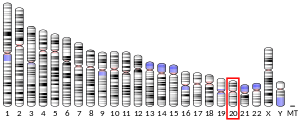STX16
Syntaxin-16 is a protein that in humans is encoded by the STX16 gene.[5][6][7][8]
It has been associated with pseudohypoparathyroidism type Ib. Losing this gene causes loss of methylation at GNAS1 exon A/B.[7]
Interactions
STX16 has been shown to interact with VAMP4.[9]
gollark: Much more power-efficient.
gollark: I don't actually have a "heart", I replaced it with nanoscale bees.
gollark: Yes, any intruders would just be orbital-lased.
gollark: I didn't actually have the sound up enough to notice anything, myself.
gollark: Do hearts have opinions, though? I don't think they have enough neural stuff in them for complex cognition.
References
- GRCh38: Ensembl release 89: ENSG00000124222 - Ensembl, May 2017
- GRCm38: Ensembl release 89: ENSMUSG00000027522 - Ensembl, May 2017
- "Human PubMed Reference:". National Center for Biotechnology Information, U.S. National Library of Medicine.
- "Mouse PubMed Reference:". National Center for Biotechnology Information, U.S. National Library of Medicine.
- Tang BL, Low DY, Lee SS, Tan AE, Hong W (Jan 1998). "Molecular cloning and localization of human syntaxin 16, a member of the syntaxin family of SNARE proteins". Biochemical and Biophysical Research Communications. 242 (3): 673–9. doi:10.1006/bbrc.1997.8029. PMID 9464276.
- Simonsen A, Bremnes B, Rønning E, Aasland R, Stenmark H (Mar 1998). "Syntaxin-16, a putative Golgi t-SNARE". European Journal of Cell Biology. 75 (3): 223–31. doi:10.1016/S0171-9335(98)80116-7. PMID 9587053.
- Linglart A, Gensure RC, Olney RC, Jüppner H, Bastepe M (May 2005). "A novel STX16 deletion in autosomal dominant pseudohypoparathyroidism type Ib redefines the boundaries of a cis-acting imprinting control element of GNAS". American Journal of Human Genetics. 76 (5): 804–14. doi:10.1086/429932. PMC 1199370. PMID 15800843.
- "Entrez Gene: STX16 syntaxin 16".
- Mallard F, Tang BL, Galli T, Tenza D, Saint-Pol A, Yue X, Antony C, Hong W, Goud B, Johannes L (Feb 2002). "Early/recycling endosomes-to-TGN transport involves two SNARE complexes and a Rab6 isoform". The Journal of Cell Biology. 156 (4): 653–64. doi:10.1083/jcb.200110081. PMC 2174079. PMID 11839770.
Further reading
- Yu Y, Zhang C, Zhou G, Wu S, Qu X, Wei H, Xing G, Dong C, Zhai Y, Wan J, Ouyang S, Li L, Zhang S, Zhou K, Zhang Y, Wu C, He F (Aug 2001). "Gene expression profiling in human fetal liver and identification of tissue- and developmental-stage-specific genes through compiled expression profiles and efficient cloning of full-length cDNAs". Genome Research. 11 (8): 1392–403. doi:10.1101/gr.175501. PMC 311073. PMID 11483580.
- Mallard F, Tang BL, Galli T, Tenza D, Saint-Pol A, Yue X, Antony C, Hong W, Goud B, Johannes L (Feb 2002). "Early/recycling endosomes-to-TGN transport involves two SNARE complexes and a Rab6 isoform". The Journal of Cell Biology. 156 (4): 653–64. doi:10.1083/jcb.200110081. PMC 2174079. PMID 11839770.
- Dulubova I, Yamaguchi T, Gao Y, Min SW, Huryeva I, Südhof TC, Rizo J (Jul 2002). "How Tlg2p/syntaxin 16 'snares' Vps45". The EMBO Journal. 21 (14): 3620–31. doi:10.1093/emboj/cdf381. PMC 126126. PMID 12110575.
- Clark AG, Glanowski S, Nielsen R, Thomas PD, Kejariwal A, Todd MA, Tanenbaum DM, Civello D, Lu F, Murphy B, Ferriera S, Wang G, Zheng X, White TJ, Sninsky JJ, Adams MD, Cargill M (Dec 2003). "Inferring nonneutral evolution from human-chimp-mouse orthologous gene trios". Science. 302 (5652): 1960–3. doi:10.1126/science.1088821. PMID 14671302.
- Tai G, Lu L, Wang TL, Tang BL, Goud B, Johannes L, Hong W (Sep 2004). "Participation of the syntaxin 5/Ykt6/GS28/GS15 SNARE complex in transport from the early/recycling endosome to the trans-Golgi network". Molecular Biology of the Cell. 15 (9): 4011–22. doi:10.1091/mbc.E03-12-0876. PMC 515336. PMID 15215310.
- Colland F, Jacq X, Trouplin V, Mougin C, Groizeleau C, Hamburger A, Meil A, Wojcik J, Legrain P, Gauthier JM (Jul 2004). "Functional proteomics mapping of a human signaling pathway". Genome Research. 14 (7): 1324–32. doi:10.1101/gr.2334104. PMC 442148. PMID 15231748.
- Amessou M, Fradagrada A, Falguières T, Lord JM, Smith DC, Roberts LM, Lamaze C, Johannes L (Apr 2007). "Syntaxin 16 and syntaxin 5 are required for efficient retrograde transport of several exogenous and endogenous cargo proteins". Journal of Cell Science. 120 (Pt 8): 1457–68. doi:10.1242/jcs.03436. PMC 1863825. PMID 17389686.
This article is issued from Wikipedia. The text is licensed under Creative Commons - Attribution - Sharealike. Additional terms may apply for the media files.



